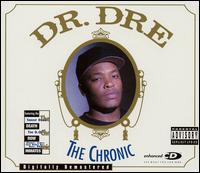Contents |
Origins
 Dr. Dre's The Chronic (1992) is a seminal album that defined the musical conventions of
G-Funk
Dr. Dre's The Chronic (1992) is a seminal album that defined the musical conventions of
G-Funk
There has been some debate over who should be considered the "father of G-funk." Some consider N.W.A leader Eazy-E to be the originator of the subgenre; however, while N.W.A was undoubtedly a gangsta rap group, their beats (produced by Dr. Dre and DJ Yella) were much rawer and grittier than the G-funk sound Dr. Dre popularized with The Chronic. Others argue that Above The Law are the originators of the sound (the sound being present in one of their tracks titled "Call it what you want", being recorded before The Chronic). Since The Chronic was the first G-Funk album to go mainstream and gain nation wide attention, it is generally agreed that G-funk started with Dr. Dre. Some have drawn comparisons between G-funk and San Francisco-based Mobb Music, which has never gained widespread mainstream success but incorporates elements similar to G-funk, with more tempo variations, less portamento, synthesizers, Moog bass lines, and more live instruments.
Criticism and Backlash
Prior to the success of The Chronic, prominent groups of the golden age of hip hop such as Public Enemy and Native Tongues Posse, embraced more socially aware issues such as drug abuse, poverty, racism, and African American empowerment. Whereas rappers utilizing the G-funk sound essentially rapped about the gangsta subject matter that Dre's former group, N.W.A, had helped bring to the mainstream in the late 1980s. This led to some criticism from hip hop purists, who accused these rappers of "dumbing down" rap (as demonstrated by Common’s I Used to Love H.E.R). Furthermore, because of its mainstream appeal and popularity, G-Funk was regarded by hip hop purists, as a watered down form of music. This was a view that was particularly prevalent among several East Coast critics, DJs, and radio personalities. It was this disillusionment with mainstream hip hop that led certain hip hop critics to enthusiastically embrace East Coast albums such as Black Moon's Enta Da Stage, The Wu-Tang Clan's Enter the Wu-Tang (36 Chambers) (see 1993 in music), and Nas's and The Notorious B.I.G.'s respective debuts: Illmatic and Ready to Die. These successive releases were hailed as the beginning of an East Coast hip hop renaissance, that later included albums such as Only Built 4 Cuban Linx, The Infamous, Doe Or Die, and Reasonable Doubt.
Despite such criticism and mounting pressure from censorship groups opposed to gangsta rap, The Chronic and to a lesser extent, Doggystyle, were both critically-acclaimed as well as commercially successful. The singles "Nuthin' But a "G" Thang" (The Chronic) and "Gin and Juice" (Doggystyle) became the most famous examples of G-funk in this era. The G-funk sound could also be heard in rapper 2Pac's most popular releases, including Me Against the World and most notably the song "Cant C Me" (produced by Dr. Dre) featured on All Eyez on Me, the latter of which was released on the Death Row label.
End of the G-funk era
In 1996, following Dr. Dre's departure from Death Row Records, Tupac Shakur's murder, and Suge Knight's imprisonment for racketeering, the G-funk era effectively came to an end. Dr. Dre attempted to update and expand on the sound with his 1996 release Dr. Dre Presents...The Aftermath as well as 1997's Nas, Foxy Brown, AZ, and Nature Present The Firm: The Album, the latter of which he partially produced. While both albums went platinum, they were unsuccessful by Dre's standards, and had little impact on the hip-hop scene.
However, the G-funk sound has had a lasting impact on hip hop, and its influence can be heard in albums such as Dre's successful 1999 comeback 2001, which features a significantly different production style from The Chronic but has its roots in the G-funk sound he helped pioneer.
-
"Nuthin' But A 'G' Thang (sample)"
- Short sample of Nuthin' But A 'G' Thang, by Dr. Dre, ft. Snoop Doggy Dogg - harsh language advisory.
-
"Gin and Juice (sample)"
- Short sample of Gin and Juice, by Snoop Doggy Dogg - harsh language advisory.
Categories: Hip hop genres




 216.73.216.133
216.73.216.133 User Stats:
User Stats:
 Today: 0
Today: 0 Yesterday: 0
Yesterday: 0 This Month: 0
This Month: 0 This Year: 0
This Year: 0 Total Users: 117
Total Users: 117 New Members:
New Members:
 216.73.xxx.xxx
216.73.xxx.xxx
 Server Time:
Server Time: